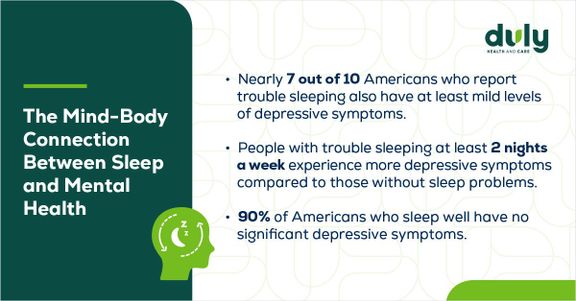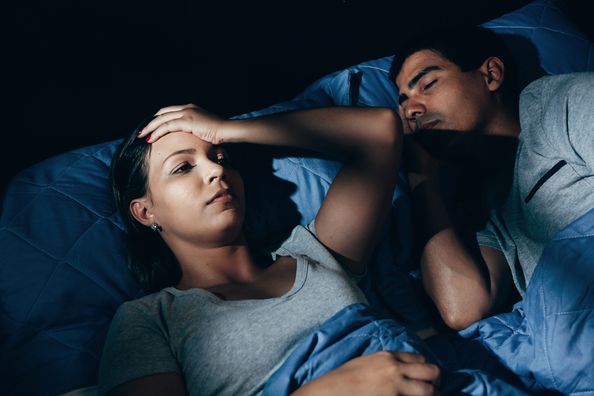As the new year approaches, you might be brainstorming goals to improve your mental wellness, like practicing mindfulness or limiting your screen time each day. Another simple but effective way to improve your mental health may come as a surprise — get better sleep.
Sleep and mental health are closely intertwined. By getting enough quality sleep (between 7 and 9 hours), you’ll improve your cognitive skills, emotional regulation, and ability to cope with stress. On the other hand, lack of sleep can lead to irritability, fatigue, trouble focusing, difficulty making decisions, depression, and anxiety (not to mention physical problems, like heart disease and diabetes).

Source: How is Your Sleep Health Linked to Your Mental Health?
The connection between sleep and mental health goes both ways. Not getting enough sleep can negatively impact your mental health. At the same time, mental health conditions, like depression and anxiety, may make it harder to sleep.
Here’s how sleep impacts your mental health and vice versa — and how to improve both.
How a Lack of Sleep Impacts Your Mental Health
In addition to letting your body rest and recover from the day, sleep helps keep your brain working as it should and supports your mental health.
When you sleep, your brain repairs itself, consolidates memories, and processes emotions. It also prepares for the next day, creating new pathways to support your learning and memory. Sleep also helps you navigate your emotions and cope with change.
Not getting enough quality sleep can lead to depression, risky behavior, impulsiveness, mood swings, lack of motivation, and suicidal thoughts.
Too little sleep might also make stressful situations feel even more overwhelming. Minor frustrations might become major, and it might be harder to focus on the positive parts of your day.
Finally, if you’re already experiencing mental health challenges, poor sleep can make them worse. What’s more, a severe lack of sleep can reduce the effectiveness of some treatments.
Is your lack of sleep leading to mental health concerns? Talk to a Duly behavioral and mental health specialist to get the support you need.
How Mental Health Conditions Impact Your Sleep
Just as not enough sleep can damage your mental health, existing mental health conditions can make it harder to sleep.
Some examples of mental health conditions and their impact on sleep include:
- Depression, which may make you more likely to be less physically active and get less sunlight exposure — both of which can lead to sleep problems
- Post-traumatic stress disorder (PTSD), which can cause nightmares that negatively affect sleep
- Substance use disorders, which can disturb sleep patterns while using or withdrawing from substances
Other mental health conditions that are linked to trouble sleeping include anxiety, attention deficit hyperactivity disorder (ADHD), bipolar disorder, obsessive-compulsive disorder (OCD), and panic disorders.
Taking Care of Your Mind and Body With Quality Sleep
The sleep and mental health connection is a strong one. It can also be frustrating, as problems with one can lead to problems with the other, making it difficult to break the cycle.
The bottom line is that getting enough quality sleep is key to preventing and managing mental health conditions. Set yourself up for sleep success by:
- Getting exposure to natural light (or an equivalent) during the day
- Exercising regularly (at least 30 minutes a day, 5 days a week)
- Avoiding alcohol, caffeine, nicotine, heavy meals, and electronic devices before bedtime
- Keeping your sleep routines consistent
- Sleeping in a cool, quiet, and dark environment
If you’re still finding it difficult to sleep, talk to your healthcare provider. They will help you adjust your sleep schedule and environment to promote better sleep. They can also refer you to a behavioral health expert or sleep specialist if needed.
Sleep is a critical part of your mental and physical health. By prioritizing enough shut-eye each night, every day can look a little brighter.
Health Topics:








